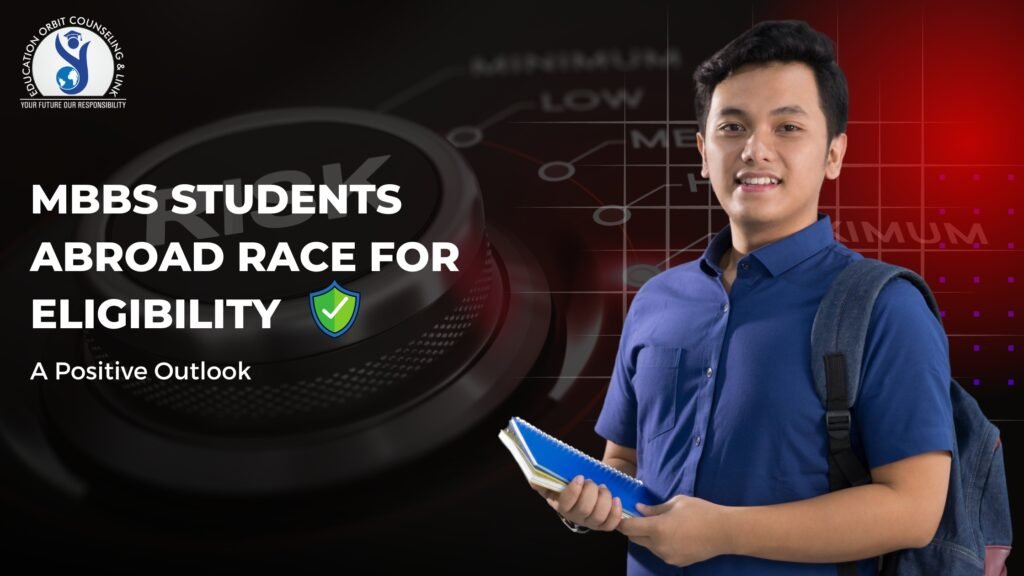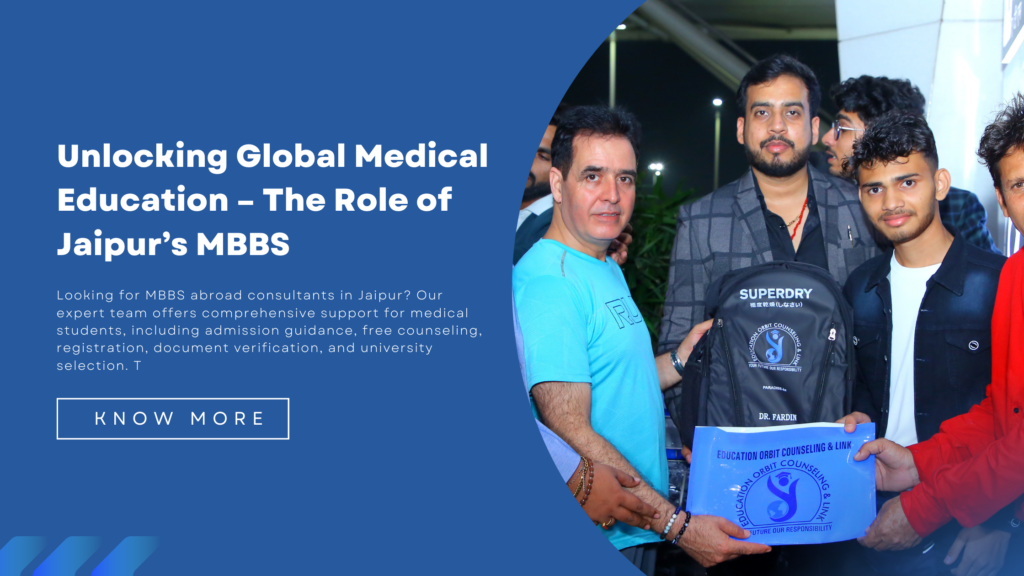Studying MBBS abroad offers incredible opportunities for students, such as world-class education, affordable fees, and the chance to experience new cultures. However, in recent years, some students have faced challenges related to degree recognition and obtaining the necessary eligibility certificates on time. While this might seem daunting, there is a positive side to the situation: with timely planning, the right guidance, and a clear understanding of the process, students can overcome these hurdles and safeguard their medical careers.
In this blog, we’ll take a closer look at the degree risks MBBS students abroad might face and how they can effectively race against time to secure their eligibility certificates. Let’s focus on actionable steps and solutions to ensure a smooth journey for aspiring doctors.
Understanding the Eligibility Certificate Requirement
What is the Eligibility Certificate?
The Eligibility Certificate is a crucial document required by Indian medical students who wish to study MBBS abroad. It is issued by the National Medical Commission (NMC) and certifies that the student is eligible to pursue medical education outside India. This certificate is mandatory for students who want to practice medicine in India after completing their degree abroad.
Why Is It Important?
Without an eligibility certificate, students may face challenges in having their degrees recognized in India. This could result in delays in taking the Foreign Medical Graduate Examination (FMGE) or the National Exit Test (NEXT), which are essential for practicing as a doctor in India. Therefore, securing this document on time is crucial to avoid disruptions in your career.
Challenges Faced by MBBS Students Abroad
While studying MBBS abroad has numerous benefits, students may face some challenges, especially regarding the degree risks associated with failing to obtain an eligibility certificate. Here are a few common challenges:
- Unawareness of the Process: Many students are unaware that they need an eligibility certificate before starting their medical education abroad, which can lead to complications later on.
- Racing Against Time: Students often realize the importance of the eligibility certificate too late. Delays in obtaining it can create stress and anxiety as it might affect their ability to practice in India.
- Documentation Issues: In some cases, students struggle with the required documentation or miss deadlines, resulting in unnecessary delays.
- Unrecognized Universities: Another risk involves studying at universities not recognized by the National Medical Commission (NMC). Without proper research, students may unknowingly enroll in institutions that don’t meet the criteria for degree recognition in India.
Turning Challenges into Opportunities: A Positive Approach
While these challenges are real, they are certainly not insurmountable. Here are some positive strategies to ensure you stay on track and avoid the risks associated with studying MBBS abroad.
1. Be Proactive: Start Early
One of the most important steps is to start the process early. Apply for your eligibility certificate as soon as you secure admission to an MBBS program abroad. By being proactive, you can avoid the last-minute race and ensure all paperwork is in order.
Steps to Follow:
- Visit the NMC website to check the list of recognized foreign medical universities.
- Ensure you meet the eligibility criteria set by the NMC.
- Prepare all necessary documents, including your 10th and 12th-grade mark sheets, NEET scores, passport details, and university admission letter.
2. Stay Informed: Know the Process
It’s crucial to stay informed about the eligibility certificate process and any changes in regulations. Regularly check the official NMC website and keep in touch with your university’s admission office for updates.
Actionable Tips:
- Sign up for NMC newsletters or updates to stay informed about any changes in the eligibility certificate rules.
- Join student forums and social media groups where students share their experiences and updates on MBBS abroad and certificate applications.
3. Choose the Right University
Before deciding to study MBBS abroad, thoroughly research the universities you’re considering. Make sure they are listed on the NMC’s approved list. Choosing the right university minimizes the risk of your degree not being recognized in India.
Key Considerations:
- Look for NMC-approved universities with a good track record of graduates successfully passing the FMGE/NEXT exams.
- Speak to alumni or current students to understand their experiences with degree recognition and the eligibility certificate process.
4. Seek Professional Guidance
Navigating the complexities of studying MBBS abroad can be overwhelming. That’s where expert guidance comes in. Consulting with MBBS abroad consultants can help you avoid common pitfalls and ensure you have all the necessary paperwork in place.
Benefits of Professional Counseling:
- They help you choose the right university.
- Assist with the application process for eligibility certificates.
- Provide guidance on documentation, visa applications, and other requirements.
5. Stay Organized and Document Everything
Proper documentation is key when applying for an eligibility certificate. Keep track of all required documents and deadlines. Maintaining a checklist will ensure you don’t miss any crucial steps.
Checklist for MBBS Abroad Students:
- NMC eligibility certificate application form
- NEET scorecard
- 10th and 12th-grade mark sheets
- Passport copy
- Admission letter from a recognized university
Focus on the Positive Outcomes
While obtaining an eligibility certificate and navigating degree risks might seem challenging, remember that thousands of students successfully complete MBBS abroad and go on to have successful careers. The key lies in being informed, prepared, and proactive.
Benefits of Studying MBBS Abroad:
- Global Exposure: Studying abroad offers exposure to diverse medical practices and new cultures, enriching your education.
- Affordable Fees: Countries like Russia, Ukraine, and the Philippines offer MBBS programs at lower fees compared to private medical colleges in India.
- High-Quality Education: Many foreign universities are recognized for their world-class infrastructure and teaching standards.
By focusing on these positive aspects and ensuring you have your eligibility certificate, you can enjoy the benefits of an MBBS abroad experience without worrying about degree risks.
Conclusion
Yes, MBBS students abroad may face challenges like obtaining the eligibility certificate and ensuring degree recognition, but these obstacles are manageable with the right approach. By starting early, staying informed, and seeking professional guidance, you can successfully navigate the process and safeguard your medical career.
In the end, with proper planning and a positive mindset, the dream of becoming a doctor through MBBS abroad can be achieved without unnecessary stress. Just stay proactive and make sure you meet all the requirements, including securing your eligibility certificate, to ensure a bright future ahead!



